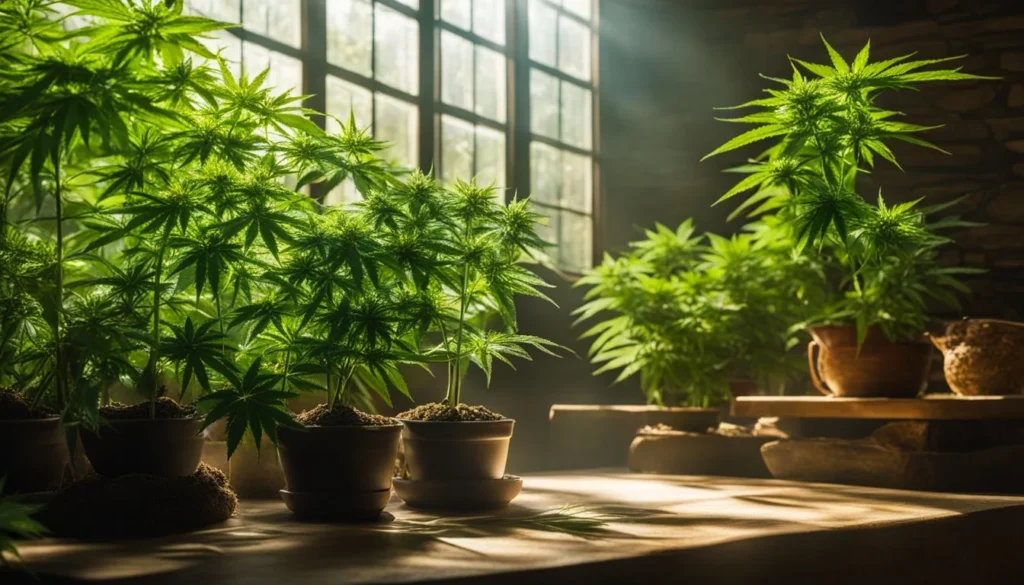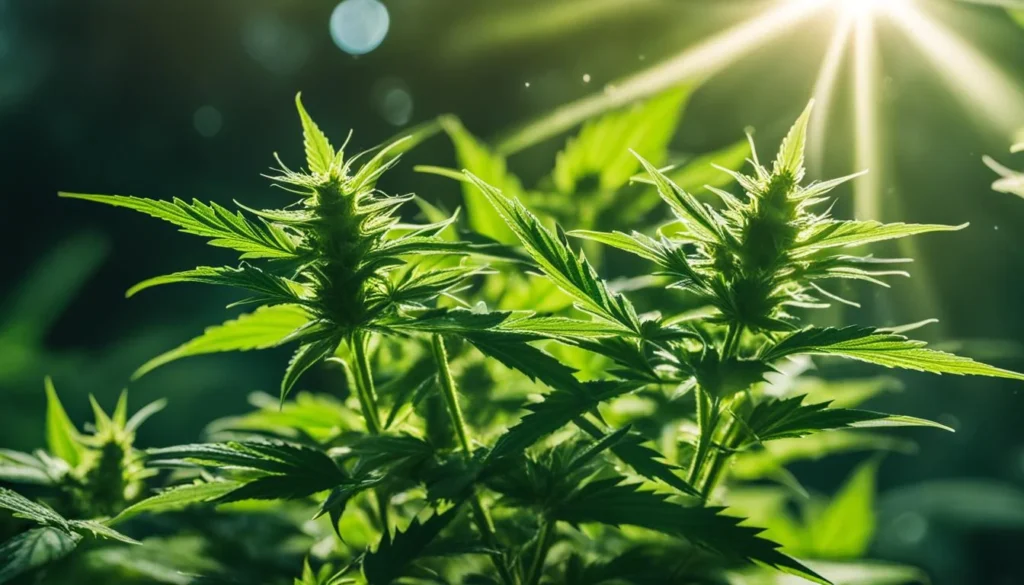Growing premium organic cannabis is a meticulous process that requires a deep commitment to quality, sustainability, and health. At our cultivation facility, we prioritize nature’s wisdom and embrace organic practices to produce the finest-quality flowers and the healthiest plants. By going back to our roots and focusing on high-quality soil and biodiversity, we create an environment that transforms waste into valuable resources, benefiting both our gardens and the environment.

Key Takeaways:
- Premium organic cannabis is grown using sustainable and environmentally friendly cultivation methods.
- High-quality soil and biodiversity are essential for producing top-quality organic cannabis.
- Organic cultivation transforms waste into valuable resources, benefiting both the gardens and the environment.
- By embracing organic practices, we can cultivate cannabis that is safe, potent, and flavorful.
- Choosing organic cannabis supports a healthier and more sustainable future for consumers and the planet.
Perfect Organic Soil for Cannabis
When it comes to cultivating premium organic cannabis, one of the key elements to consider is the perfect organic soil. Creating a nutrient-rich environment for your cannabis plants not only ensures their health and vitality but also contributes to the overall quality of the flowers.
To achieve the ideal organic soil for cannabis cultivation, it is important to prioritize the soil food web. This intricate network of microorganisms, insects, and other creatures plays a crucial role in breaking down organic matter and providing essential nutrients to the plants. By avoiding practices like tilling and the use of chemical fertilizers and pesticides, you can preserve and nurture the natural balance of the soil ecosystem.
Organic soil amendments such as compost, worm castings, and manure are excellent sources of nutrients for cannabis plants. These natural additives provide a wide range of essential elements, including nitrogen, phosphorus, potassium, and micronutrients, which are vital for healthy plant growth.
Table: Organic Soil Amendments
| Amendment | Benefits |
|---|---|
| Compost | Improves soil structure, retains moisture, and enhances nutrient availability. |
| Worm Castings | Rich in beneficial microorganisms, enzymes, and nutrients, promoting overall plant health. |
| Manure | Provides a balanced source of organic matter, nutrients, and beneficial bacteria. |
By focusing on perfect organic soil, you can create a thriving environment for your cannabis plants, resulting in premium-quality flowers with superior flavor, potency, and aroma.
The Benefits of Growing in Beds or Containers
When it comes to growing cannabis, you have the option of using garden beds or containers. Each method has its advantages, and the choice depends on your specific needs and circumstances. Let’s explore the benefits of both options.
Garden Beds
Garden beds allow roots to penetrate deep into the soil, providing a more stable and nutrient-rich environment for your cannabis plants. This is particularly beneficial for larger strains that require ample space to grow and develop. Garden beds also promote soil health and biodiversity, which can enhance the overall well-being of your plants.
Containers
If you need more flexibility in your cannabis cultivation, containers are an excellent choice. With containers, you have the freedom to move your plants indoors or to a greenhouse if necessary, protecting them from extreme weather conditions. Fabric pots, in particular, offer several advantages for cannabis growth. They promote better aeration, preventing water retention and ensuring optimal root health.
Ultimately, the decision between garden beds and containers depends on your specific circumstances, such as the space available, the strain of cannabis you’re growing, and your environmental conditions. Consider these factors to determine which option best suits your needs and preferences.
Macronutrients and Micronutrients for Cannabis Growth
When it comes to growing healthy and thriving cannabis plants, providing them with the right balance of macronutrients and micronutrients is essential. Macronutrients are the primary elements needed in larger quantities, while micronutrients are required in smaller amounts. By understanding the role of these nutrients and ensuring their availability, you can promote optimal cannabis growth and maximize your harvest.
Macronutrients:
Macronutrients are the building blocks that cannabis plants need to develop strong tissues, support photosynthesis, and produce robust flowers. Here are the key macronutrients and their functions:
- Nitrogen (N): Promotes leaf and stem growth, as well as chlorophyll production.
- Phosphorous (P): Supports root development, energy transfer, and bud formation.
- Potassium (K): Enhances overall plant health, stress resistance, and floral production.
- Sulfur (S): Aids in the synthesis of proteins and the production of essential oils.
- Magnesium (Mg): Facilitates chlorophyll formation and enzyme activity.
- Calcium (Ca): Reinforces cell walls and provides structural support.
Micronutrients:
Micronutrients may be required in smaller quantities, but they are equally important for cannabis plants’ optimal growth. Here are the essential micronutrients and their functions:
- Boron (B): Essential for carbohydrate transport and cell division.
- Copper (Cu): Participates in enzyme activity and chlorophyll formation.
- Iron (Fe): Crucial for chlorophyll synthesis and electron transport.
- Manganese (Mn): Supports photosynthesis and enzyme functions.
- Molybdenum (Mo): Required for nitrogen fixation and enzyme activity.
- Zinc (Zn): Plays a role in enzyme function and hormone production.
By providing cannabis plants with a well-balanced mix of macronutrients and micronutrients, you can ensure their vitality, resilience, and productivity. Incorporating organic sources such as seaweed, compost, and bone meal into your soil or nutrient solution can help to supply these essential elements and promote healthy cannabis growth.
| Macronutrients | Functions |
|---|---|
| Nitrogen (N) | Promotes leaf and stem growth, chlorophyll production |
| Phosphorous (P) | Supports root development, energy transfer, bud formation |
| Potassium (K) | Enhances overall plant health, stress resistance, floral production |
| Sulfur (S) | Aids in protein synthesis, essential oil production |
| Magnesium (Mg) | Facilitates chlorophyll formation, enzyme activity |
| Calcium (Ca) | Reinforces cell walls, provides structural support |
| Micronutrients | Functions |
|---|---|
| Boron (B) | Essential for carbohydrate transport, cell division |
| Copper (Cu) | Participates in enzyme activity, chlorophyll formation |
| Iron (Fe) | Crucial for chlorophyll synthesis, electron transport |
| Manganese (Mn) | Supports photosynthesis, enzyme functions |
| Molybdenum (Mo) | Required for nitrogen fixation, enzyme activity |
| Zinc (Zn) | Plays a role in enzyme function, hormone production |
The Benefits of Organic Cannabis Growing
Growing organic cannabis offers numerous benefits that make it an appealing choice for both cultivators and consumers. By following organic cultivation methods, you can produce clean and natural cannabis that is not only environmentally friendly but also of higher quality. Here are some of the key advantages of growing organic cannabis:
1. Enhanced Quality:
Organic cultivation methods prioritize the use of natural nutrients and pesticides, resulting in healthier plants. This translates to improved flavor, aroma, and potency in the final product. With organic cannabis, you can enjoy a more authentic and enjoyable experience.
2. Environmentally Friendly:
Organic cannabis cultivation minimizes the use of synthetic chemicals, reducing the environmental impact associated with conventional methods. By eliminating harmful pesticides and fertilizers, you contribute to the preservation of soil health, biodiversity, and overall ecosystem balance.
3. Health and Safety:
Consumers are increasingly concerned about the presence of chemicals in their cannabis. By growing organically, you ensure that your product is free from harmful residues, providing peace of mind to users who prioritize clean and natural options. Organic cannabis is particularly popular among medical users who seek safe and high-quality products.
4. Market Demand:
The demand for organic cannabis has been steadily growing, driven by a rising awareness of the benefits it offers. Consumers are willing to pay a premium for cannabis that is grown organically, making it a valuable commodity in the market. As a cultivator, tapping into this demand can lead to increased sales and profitability.
By choosing to grow organic cannabis, you not only contribute to a healthier and more sustainable future but also position yourself to meet the growing demand for clean and natural products. Embracing organic cultivation methods can elevate the quality of your cannabis, benefit the environment, and cater to the preferences of consumers who prioritize safety and authenticity.
How We Grow Clean and Natural Cannabis
At The Fire Garden, we are committed to using sustainable growing methods to produce clean and natural cannabis. Our cultivation process begins with selecting premium organic seeds and nurturing them in a custom greenhouse designed for efficiency and preventing cross-contamination. We prioritize the health and well-being of our plants by providing them with living soil enriched with organic compost and worm castings. This living soil not only nourishes the plants but also promotes a healthy soil microbiome, resulting in robust and thriving cannabis plants.
In addition to our focus on soil health, we employ hand-trimming techniques to ensure the highest quality flowers. This meticulous process allows us to carefully select and preserve the most desirable parts of the plant, ultimately enhancing the potency, flavor, and aroma of our cannabis. To further align with our commitment to sustainability, we use 100% recyclable packaging for our products.
As part of our dedication to clean and natural cannabis, we follow the guidelines set by the Clean Green Certified® program, a certification for organically grown cannabis. These guidelines ensure that our cultivation methods prioritize the health of our team members, patients, and the environment. By adhering to these sustainable practices, we can provide our customers with a premium product that is not only clean and natural but also environmentally responsible.

Our Commitment to Sustainability
At The Fire Garden, sustainability is at the core of our operations. We strive to minimize our environmental impact and conserve resources throughout our cultivation process. Here are some of the sustainable growing methods we employ:
- Water conservation: We use advanced irrigation systems and water-saving techniques to minimize water consumption.
- Energy efficiency: Our custom greenhouse incorporates energy-efficient technologies to reduce energy consumption and minimize greenhouse gas emissions.
- Integrated pest management: We prioritize biological controls and natural pest deterrents to minimize the use of chemical pesticides.
- Waste reduction: We implement recycling and composting programs to minimize waste and promote a circular economy.
Through these sustainable growing methods, we can produce clean and natural cannabis while minimizing our ecological footprint. We believe that by taking care of the environment, we can provide our customers with a product that is not only of the highest quality but also aligns with their values and concerns about sustainability.
| Benefits of Our Clean and Natural Cannabis | |
|---|---|
| Improved Potency | Our organic cultivation methods result in cannabis with a complex nutrient profile, leading to increased potency and enhanced effects. |
| Enhanced Flavor and Aroma | The use of organic nutrients and the preservation of desirable plant parts through hand-trimming contribute to the rich flavors and aromatic profiles of our cannabis. |
| Health and Safety | Our commitment to clean and natural cannabis means that our products are free from harmful chemicals and pesticides, ensuring the health and safety of our customers. |
| Environmental Responsibility | By employing sustainable growing methods, we minimize our environmental impact and contribute to a healthier planet for future generations. |
The Demand for Organic Cannabis
The demand for organic cannabis has seen a significant rise alongside the expanding medicinal cannabis industry. With more patients seeking safe and high-quality products, organic options have become increasingly popular. The concerns about the presence of dangerous chemicals in non-organic cannabis have driven this demand, as consumers prioritize their health and well-being.
Medicinal cannabis users, in particular, are more conscious of the potential risks associated with non-organic products and are actively seeking organic alternatives. They want to ensure that the cannabis they consume is free from harmful pesticides and chemical fertilizers. By choosing organic cannabis, they can have confidence in the purity and quality of their medication.
While small-scale and home growers have embraced organic cultivation methods, commercial growers often face challenges in transitioning to organic practices. Misconceptions about organic growing, such as concerns about lower crop yields or ineffective pest control, can hinder the adoption of organic methods. However, as consumer demand for organic cannabis continues to grow, commercial growers are recognizing the need to meet this demand and are gradually embracing organic cultivation techniques.
The Benefits of Organic Cannabis for Medicinal Use
Organic cannabis provides several benefits for medicinal users. By eliminating the use of synthetic chemicals, organic cultivation promotes a cleaner and purer product. This is crucial for patients who may have compromised immune systems or sensitivities to chemicals. In addition, organic cannabis is often grown in nutrient-rich soils, resulting in a product that is higher in beneficial compounds, offering potentially enhanced therapeutic effects.
| Benefits of Organic Cannabis for Medicinal Use |
|---|
| Higher purity due to the absence of synthetic chemicals |
| Potentially enhanced therapeutic effects from nutrient-rich soils |
| Reduced risk of adverse reactions or side effects |
| Assurance of a safer and more reliable medication |
Patients can also benefit from reduced risks of adverse reactions or side effects when consuming organic cannabis. The absence of synthetic pesticides and chemical additives minimizes the potential harm to the body, allowing patients to use cannabis as a safer and more reliable medication.
The demand for organic cannabis continues to grow as consumers seek safe and high-quality products. With the increasing recognition of the benefits of organic cultivation, both in terms of patient health and environmental sustainability, organic cannabis is becoming a preferred choice for medicinal use.
What Is Organic Cannabis?
Organic cannabis refers to the cultivation of cannabis using natural nutrients and pesticides that meet organic standards. Unlike conventional cannabis cultivation, which may involve the use of synthetic fertilizers and chemical pesticides, organic cannabis is grown using substances derived from sources like bat guano, worm castings, manure, and compost. This method prioritizes the health of the plants, the environment, and the consumers who consume the final product.
However, there is ongoing debate surrounding the impact of these natural substances on human and environmental health. While organic cannabis is often associated with soil-grown cannabis, it is important to note that not all soil-grown cannabis is necessarily organic. To be classified as organic, the nutrients and pesticides used in the cultivation process must conform to organic standards.
Organic cannabis cultivation offers a cleaner and more natural alternative to conventional methods, ensuring that the final product is free from harmful chemicals and synthetic additives. As consumer demand for organic products continues to rise, choosing organic cannabis supports a safer and more sustainable approach to cannabis cultivation.
The Top 5 Benefits of Organic Cannabis
Growing organic cannabis offers numerous advantages that make it a popular choice among consumers. Here are the top five benefits of choosing organic cannabis:
- Improved Yield: Organic cultivation methods focus on building healthy soil, which results in stronger root systems and increased nutrient absorption. This leads to higher yields and larger, more robust cannabis plants.
- Increased Potency: Organic cannabis tends to have higher levels of cannabinoids and terpenes, resulting in greater potency. The complex nutrient profile provided by organic growing practices enhances the natural chemical composition of the plant.
- Enhanced Flavor and Aroma: Organic cannabis is known for its rich, nuanced flavors and aromatic profiles. By avoiding synthetic fertilizers and pesticides, organic growers can preserve the natural tastes and smells of the plant.
- Healthier Consumption: Choosing organic cannabis means minimizing exposure to harmful chemicals and toxins. Organic cultivation methods prioritize the use of natural nutrients and pest control, resulting in a cleaner and safer product for consumption.
- Environmental Impact: Organic cultivation reduces reliance on synthetic chemicals, which can contaminate soil, water, and surrounding ecosystems. By prioritizing sustainability and soil health, organic growers help preserve the environment for future generations.
Overall, organic cannabis offers a range of benefits, including improved yield potential, increased potency, enhanced flavor and aroma, healthier consumption, and a lighter environmental impact. These advantages make organic cannabis an attractive choice for those seeking a premium and sustainable cannabis experience.

Table: Comparing Organic and Conventional Cannabis
| Aspect | Organic Cannabis | Conventional Cannabis |
|---|---|---|
| Cultivation Method | Uses natural nutrients and pesticides | Relies on synthetic chemicals |
| Yield Potential | Improved with healthy soil and nutrient absorption | May vary depending on cultivation practices |
| Potency | Higher levels of cannabinoids and terpenes | Varies depending on strain and cultivation practices |
| Flavor and Aroma | Rich, nuanced tastes and smells | May be affected by synthetic chemicals |
| Health Impact | Cleaner and safer for consumption | Potential exposure to synthetic chemicals |
| Environmental Impact | Reduced reliance on synthetic chemicals | Potential contamination of soil and water |
Note: The table provides a comparison between organic and conventional cannabis cultivation methods, highlighting the key differences in various aspects.
A How-To Guide for Growing Organic Cannabis
If you’re interested in growing your own organic cannabis, you’ve come to the right place. In this guide, we’ll walk you through the essential steps and considerations for successful organic cultivation, whether you choose to grow indoors or outdoors.
Indoor Cultivation
When growing organic cannabis indoors, it’s crucial to create an environment that mimics the ideal conditions for plant growth. Start by selecting a suitable growing medium, such as organic soil or a soilless mix. Ensure that your plants receive proper ventilation and air circulation, as this helps prevent mold and mildew. Use organic nutrients and fertilizers to nourish your plants, and pay attention to lighting, as different stages of growth require specific light spectrums and cycles. Regularly monitor and adjust temperature, humidity, and pH levels to maintain optimal growing conditions.
Outdoor Cultivation
For those with access to outdoor space, growing organic cannabis can be a rewarding experience. Start by choosing a sunny location with well-draining soil. Prepare your soil by enriching it with organic amendments such as compost, worm castings, or manure. Plant your cannabis seeds or seedlings in the prepared soil and ensure they receive adequate water and sunlight. Keep an eye out for pests and diseases and use natural pest control methods like companion planting or organic pesticides if needed. Prune your plants as necessary to promote airflow and prevent overcrowding.
Harvesting and Curing
Once your cannabis plants reach maturity, it’s time to harvest and cure the buds. Use sharp, sterile scissors or shears to trim the mature flowers from the plants. Hang the trimmed buds upside down in a cool, dark, and well-ventilated space to dry. After drying, place the buds in air-tight containers to cure. This process allows for further development of flavors and the breakdown of chlorophyll, resulting in a smoother smoking experience. Properly cured organic cannabis can provide a superior taste, aroma, and potency.
Remember, growing organic cannabis requires patience, attention to detail, and a commitment to sustainable practices. By following this guide, you’ll be well on your way to producing your own high-quality, clean, and natural cannabis.
Conclusion
Growing premium organic cannabis is a holistic process that prioritizes soil health, biodiversity, and sustainable cultivation methods. By embracing organic practices, you can cultivate high-quality cannabis that is safe, potent, flavorful, and environmentally responsible. Choosing organic cannabis supports a healthier and more sustainable future for both consumers and the planet.
Organic cultivation methods focus on using natural nutrients and pesticides derived from sources like compost, worm castings, and manure. This approach ensures that your cannabis plants receive the essential macronutrients and micronutrients they need for optimal growth. Not only does organic cannabis offer improved yield potential and increased potency, but it also enhances the flavor and aroma of your flowers.
Furthermore, growing organic cannabis benefits the environment by reducing the use of harmful chemicals and promoting a lighter ecological footprint. With organic cultivation, you can minimize the impact on soil and water resources, biodiversity, and overall ecosystem health. By choosing premium organic cannabis, you are making a conscious choice to support a healthier and more sustainable future.
FAQ
Q: How is premium organic cannabis grown?
A: Premium organic cannabis is grown by prioritizing quality, sustainability, and health. It involves cultivating the herb as nature intended, focusing on high-quality soil and biodiversity.
Q: What is the importance of healthy soil in growing organic cannabis?
A: Healthy soil is crucial for growing organic cannabis as it supports the soil food web, which provides nutrients to the plants. Preserving soil life involves avoiding practices like tilling, using pesticides, and chemical fertilizers.
Q: Should I grow cannabis in garden beds or containers?
A: The choice between garden beds and containers depends on your needs. Garden beds allow roots to penetrate deep into the soil but require protection against extreme weather conditions. Containers offer more flexibility and can be moved indoors or to a greenhouse if needed.
Q: What nutrients do cannabis plants need for optimal growth?
A: Cannabis plants require a balanced diet of macronutrients (nitrogen, potassium, phosphorous, sulfur, magnesium, and calcium) and micronutrients (boron, copper, iron, manganese, molybdenum, and zinc). Organic sources like seaweed, manure, compost, bone meal, and kelp meal can provide these essential nutrients.
Q: What are the benefits of growing organic cannabis?
A: Growing organic cannabis offers several benefits, including improved yield, increased potency, enhanced flavor and aroma, a richer soil microbiome, and a lighter environmental impact. It also meets the demands of consumers concerned about chemicals in conventional cannabis.
Q: How do you grow clean and natural cannabis?
A: We grow clean and natural cannabis by following organic and sustainable cultivation methods. Our plants are grown from seed, live in a custom greenhouse designed for efficiency and prevention of cross-contamination, and thrive in living soil enriched with compost and worm castings.
Q: Why is there a demand for organic cannabis?
A: The demand for organic cannabis has grown alongside the expansion of the medicinal cannabis industry. Patients are increasingly concerned about the presence of dangerous chemicals in non-organic cannabis and are requesting organic options.
Q: What defines organic cannabis?
A: True organic cultivation of cannabis involves using natural nutrients and pesticides, often derived from sources like bat guano, worm castings, manure, and compost. However, debates exist about the impact of these substances on human and environmental health.
Q: What are the top benefits of organic cannabis?
A: The top benefits of organic cannabis include improved yield potential, increased potency, enhanced flavor and aroma, and a lighter environmental impact. Organic cultivation supports the development of healthier plants and allows for greater control over nutrient intake and growing conditions.
Q: How can I grow organic cannabis?
A: To grow organic cannabis, it is essential to use organic soil as the growing medium. Creating a rich soil microbiome, providing organic nutrients and natural pest control methods, and maximizing environmental sustainability are key aspects of organic cultivation.




